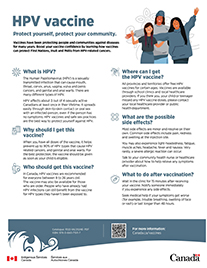HPV vaccine
Alternate format

First Nations and Inuit
(511 Kb, 1 page)
Protect yourself, protect your community.
Vaccines have been protecting people and communities against diseases for many years. Boost your vaccine confidence by learning how vaccines can protect First Nations, Inuit and Métis from HPV-related cancers.
What is HPV?
The Human Papillomavirus (HPV) is a sexually transmitted infection that can cause mouth, throat, cervix, anus, vagina, vulva and penis cancers, and genital and anal warts. There are many different types of HPV.
HPV affects about 3 out of 4 sexually active Canadians at least once in their lifetime. It spreads easily through skin-to-skin contact or oral sex with an infected person, even if the person has no symptoms. HPV vaccines and safe sex practices are the best way to protect yourself against HPV.
Why should I get this vaccine?
When you have all doses of the vaccine, it helps prevent up to 90% of HPV types that cause HPV related cancers, and genital and anal warts. For the best protection, the vaccine should be given as soon as your child is eligible.
Who should get this vaccine?
In Canada, HPV vaccines are recommended for everyone between 9 to 26 years old. The vaccine may also be available for those who are older. People who have already had HPV infections can still benefit from the vaccine for HPV types they haven’t been exposed to.
Where can I get the HPV vaccine?
All provinces and territories offer free HPV vaccines for certain ages. Vaccines are available through school clinics and local healthcare providers. If you think you, your child or teenager missed any HPV vaccine doses, please contact your local healthcare provider or public health department.
What are the possible side effects?
Most side effects are minor and resolve on their own. Common side effects include pain, redness and swelling at the injection site.
You may also experience light-headedness, fatigue, muscle aches, headache, fever and nausea. Very rarely, a severe allergic reaction can occur.
Talk to your community health nurse or healthcare provider about how to help relieve any symptoms after vaccination.
What to do after vaccination?
Wait in the clinic for 15 minutes after receiving your vaccine. Notify someone immediately if you experience any side effects.
Seek medical help if your symptoms get worse (for example, trouble breathing, swelling of face or rash) or last longer than 48 hours.
For more information: Canada.ca/vaccines